MercoPress. South Atlantic News Agency
Tag: Evo Morales
-
Tuesday, September 10th 2019 - 09:52 UTC
Bolivia's Morales alliance with large farming interests (and Amazon deforestation) could cost him his re-re-reelection
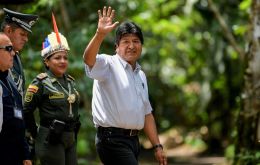
In the tropical Bolivian city of Santa Cruz de la Sierra, a wealthy farming hub on the edge on the Amazon rainforest, President Evo Morales gathered with ranchers late last month to celebrate a maiden shipment of beef to China.
-
Thursday, September 5th 2019 - 09:50 UTC
Bolivia admits forest fires has destroyed 1.7 million hectares

Wildfires raging in Bolivia's forests and grasslands since May have destroyed 1.7 million hectares, officials said on Wednesday, amid a US$11 million effort by the government to contain them.
-
Thursday, August 29th 2019 - 09:42 UTC
Bolivia admits fires have destroyed 1.2m hectares of forest; ecologists demand an end to bill promoting pastures
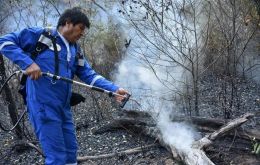
Fires have destroyed 1.2 million hectares of forest and grasslands in Bolivia this year, the government said on Wednesday, though environmentalists claim the true figure is much greater.
-
Wednesday, August 28th 2019 - 09:34 UTC
Bolivian president Morales welcomes the G7 tiny contribution to preserve the Amazon rainforest

Bolivia's president Evo Morales gave a half-hearted welcome on Tuesday to a G7 pledge of US$20 million to fight the Amazon wildfires, describing it as “tiny.” An underwhelmed Morales said the aid from the most industrialized countries was part of the world's “obligation” to preserve the Amazon rainforest.
-
Monday, August 26th 2019 - 18:18 UTC
Morales suspends re-election campaigning and calls for aid to fight blazes in the Bolivian Amazon
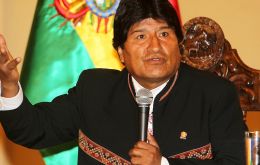
Bolivian President Evo Morales said on Sunday he is open to international aid to fight the blazes that have engulfed rural villages and doubled in size since Thursday. Morales is also suspending his campaign for re-election for at least a week, just two months from election day, to focus on the wildfires.
-
Friday, August 23rd 2019 - 09:40 UTC
Forest fires in Bolivia: half a million hectares, 1.700 fighters and a Super tanker
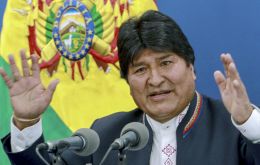
Bolivian authorities warned this week that 70% of the department of Santa Cruz — where more than a quarter of the country's population lives — is under “extreme risk” from forest fires. According to the government, nearly 500,000 hectares of forest have now been turned into ashes.
-
Thursday, July 18th 2019 - 09:40 UTC
What did the Mercosur’s leaders say about Venezuela in Santa Fe?

The political and economic crisis in Venezuela was the center of the political debate among the heads of state that, this Wednesday, met in Santa Fe, Argentina in the Mercosur semi-annual summit, a block from which the Caribbean country is currently suspended. Neither Uruguay, Bolivia nor Chile addressed a word regarding the Venezuelan situation.
-
Friday, July 12th 2019 - 12:39 UTC
Russia and Bolivia sign accords during Evo's new Moscow trip
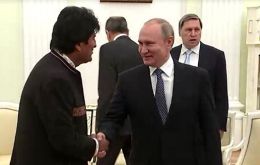
Bolivia's President Evo Morales and his Russian counterpart Vladimir Putin Thursday signed agreements in Moscow on energy, industrial, agricultural and military issues and discussed the Venezuelan crisis negotiations that are taking place in Norway between delegates of Juan Guaidó and Nicolás Maduro.
-
Tuesday, June 11th 2019 - 08:05 UTC
Paraguayan president will visit Bolivia and sign a dozen cooperation accords
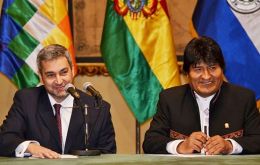
The first bi-national Bolivia-Paraguay partnership scheduled for this week will result in at least twelve cooperation agreements between the two nations, announced Paraguayan Ambassador in La Paz Terumi Matsuo.
-
Monday, May 20th 2019 - 09:59 UTC
Morales launches his presidential campaign for a fourth five-year term

Bolivian President Evo Morales launched this weekend his campaign for a fourth term, rejecting opposition allegations that he leads a corrupt and dictatorial government. Morales, 59, is Bolivia's first indigenous president and is aiming to be reelected in October.
